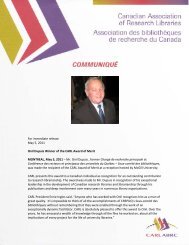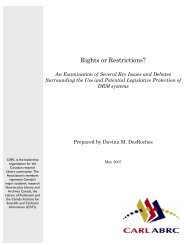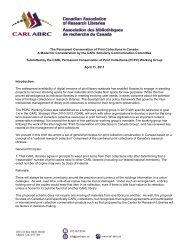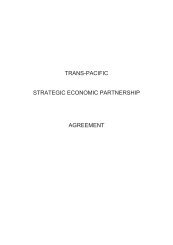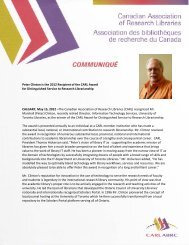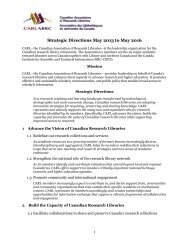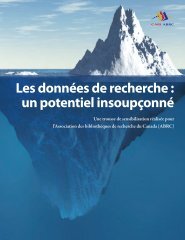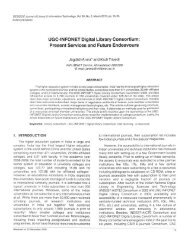PDF - CARL - ABRC
PDF - CARL - ABRC
PDF - CARL - ABRC
You also want an ePaper? Increase the reach of your titles
YUMPU automatically turns print PDFs into web optimized ePapers that Google loves.
Special Collections in ARL Libraries<br />
March 2009<br />
extension of this practice to the digital world through the provision of online exhibitions that complement the physical<br />
ones. In all contexts, an online version of the exhibit is strongly recommended as a means of ensuring that a record is<br />
kept and the institution obtains maximum benefit from all the work involved in creating the exhibit in the first place.<br />
The skills that are needed to produce an exhibition and, still more, to make sure it gets attention, are not always the<br />
same skills that special collections librarians possess by training or inclination. Particularly in repositories with only a small<br />
staff to do all the work of caring for hundreds of special collections (and that means most ARL libraries), it is helpful to<br />
have a constituency of faculty and students who are ready and able to help. These campus “volunteers,” in turn, benefit<br />
from the exposure to primary materials.<br />
Digitization<br />
Digitization is a tool that special collections professionals have long used to promote access. Standards of practice in<br />
handling the objects and dealing with metadata are now well developed, and there is a swelling body of professional<br />
literature. 29 Some questions that should be highlighted here relate again to choices.<br />
• Is there a choice to be made, for instance, between providing fuller catalog treatment or supplying a preliminary<br />
record and linking it to scanned examples from the collections?<br />
• What priority should be given to the development of cross-searching mechanisms, which can expose kindred<br />
materials in separate collections?<br />
• And then, when cross-searching can be facilitated, what impact does that have on decisions about which<br />
collections to digitize?<br />
• How do we begin to think about families, or archival groups, of collections in a digital environment?<br />
Such questions have a critical impact on access because our decisions about them influence the way our users<br />
search, and what they expect to find. The changing nature of our custodial responsibility and the changing habits of<br />
those who use our collections come sharply into focus in the digital environment.<br />
Large-Scale Digitization<br />
In all the activities mentioned above, the electronic environment has transformed the opportunities for access and will<br />
continue to change the way we all do our work. Digitization is a tool used now in virtually all special collections libraries.<br />
Most recently, the mass digitization movement, which began with large general collections in some of the largest<br />
research libraries, has begun to focus on special collections. This turn of events has much to do with the legal morass<br />
ARL’s handsomely illustrated compilation Celebrating Research is another example of how a project that highlights individual collections can<br />
also raise the visibility and use of all special collections. The volume and companion Web site have been well received by current and potential<br />
users of the collections as well as by potential library donors. See http://www.celebratingresearch.org/.<br />
29 Harvard has provided a concise bibliography of the seminal sources which outline best practice for digitizing projects, http://preserve.<br />
harvard.edu/bibliographies/digitalplanning.pdf. Some common metadata standards can be found at http://dublincore.org/ (Dublin Core),<br />
http://www.loc.gov/standards/mets/ (Metadata Encoding & Transmission Standard (METS)) and http://www.loc.gov/standards/mods/<br />
(Metadata Object Description Schema (MODS)). For additional comment on the promise of digitizing special collections, see Ricky Erway and<br />
Jennifer Schaffner, “Shifting Gears: Gearing Up to Get Into the Flow.” Report produced by OCLC Programs and Research, 2007, published<br />
online at http://www.oclc.org/programs/publications/reports/2007-02.pdf.<br />
www.arl.org/bm~doc/scwg-report.pdf Page 21



